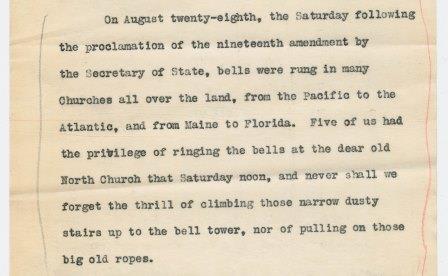By Laura Wulf, Collections Services
In an earlier post I gave you a preview of the Rose Dabney Forbes papers. Her papers are one of seven collections that have been fully digitized and are now available on our website as part of an LSTA funded project that we are calling “Women in the Public Sphere.” These collections relate to women’s involvement in social issues of the 19th and early 20th centuries- the suffrage and anti-suffrage movements, education, poverty, anti-slavery and pacifism.
The papers of Rose Dabney Forbes (1864-1947), the wife of businessman J. Malcolm Forbes (1847-1904), are mostly from her work in in the American peace movement of the early 20th century, but I also found some vivid descriptions of the excitement generated by the ratification of the nineteenth amendment in 1920 giving women the right to vote. In a typewritten draft of an address delivered to the League of Women Voters by Mrs. Forbes on 31 March 1921, she described,
that thrilling day in August when we knew with certainty that Tennessee had stepped forward and that political equality was at last in the grasp of the women of the United States. Our headquarters at Little Building held a continuous reception for several days…and all our members who were not too far off, came to talk over the wonderful news and to help Miss Luscomb and Mrs. Stantial put the final marks on the Suffrage map.
She continued,
…following the proclamation of the nineteenth amendment by the Secretary of State, bells were rung in many churches all over the land, from the Pacific to the Atlantic, and from Maine to Florida. Five of us had the privilege of ringing the bells at the dear old North Church that Saturday noon, and never shall we forget the thrill of climbing those narrow dusty stairs up to the bell tower, nor of pulling on those big old ropes.

But Mrs. Forbes and her colleagues couldn’t get caught up in the excitement for long.
[A]s we all know voting is a serious business and as soon as our first rapture subsided we had to come down to earth. The work at our office grew more exacting up to the last date for registration in October. By day there were streams of would-be voters coming to the office, or ringing up by telephone, to find out about the mysteries of voting; and we kept open for five successive Monday evenings, in order to give this same opportunity to those women whose duties precluded their coming in the day time-and hundreds availed themselves of it.
It will be fascinating to compare these descriptions with materials from another collection we digitized for this project, one which has the rather unwieldy name of the Massachusetts Association Opposed to the Extension of Further Suffrage of Women, 1895-1920. We hope that you will take advantage of these newly accessible collections and immerse yourself in the voices and the debates of their time.
Funding for the digitization of this collection and the creation of preservation microfilm was provided by the Institute of Museum and Library Services under the provisions of the Library Services and Technology Act grant as administered by the Massachusetts Board of Library Commissioners.

